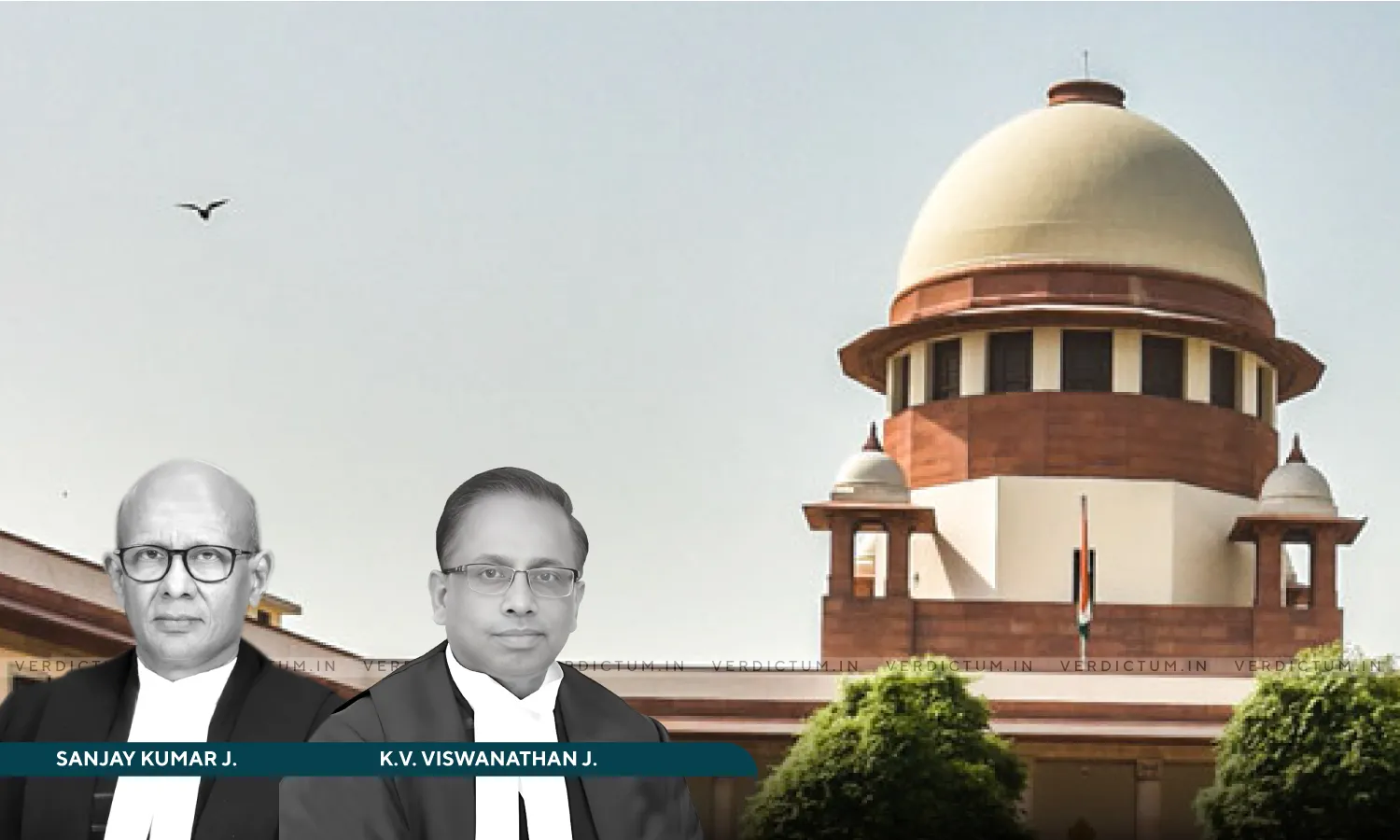Can Power-Of-Attorney Holder Who Signs Sale Deed On Behalf Of Principal Become ‘Executant’: Supreme Court Refers Issue To Larger Bench
The Appeals before the Supreme Court challenged the validity of a registered irrevocable General Power of Attorney.

Justice Sanjay Kumar, Justice K.V. Viswanathan, Supreme Court
The Supreme Court has referred the issue of whether a power-of-attorney holder who signs a sale deed on behalf of the principal would become the ‘executant’ thereof and would be covered by Section 32(a) of the Registration Act, 1908, to a larger Bench.
The Appeals before the Apex Court challenged the validity of the registered irrevocable General Power of Attorney allegedly executed by one Ranveer Singh and his wife, Gyanu Bai, in favour of their tenant G. Rajender Kumar and the validity of the three registered sale deeds executed by G. Rajender Kumar, the power-of-attorney holder, in favour of his wife, G. Shashikala.
The Division Bench of Justice Sanjay Kumar and Justice K.V. Viswanathan held, “Therefore, a power-of-attorney holder, having signed the document as an agent of the principal pursuant to the authority conferred on him by the power of attorney, then presents it for registration, having been specifically authorized to do so by the power of attorney, and not because he is the ‘executant’ of the document in terms of Section 32(a) of the Act.”
It further observed, “Rajni Tandon (supra) holds to the contrary and declares that a power-of-attorney holder who signs a sale deed on behalf of the principal would become the ‘executant’ thereof and would be covered by Section 32(a) of the Act, whereby he/she need not fulfil the requirements of Sections 32(c) and 33 of the Act and the contextual rules framed thereunder. With all due respect, as we are unable to persuade ourselves to agree with that view, we are of the considered opinion that the said issue requires to be addressed and conclusively settled by a larger Bench.”
Senior Advocate V Giri represented the Appellants while AOR Sumit Teterrwal represented the Respondents.
Factual Background
Ranveer Singh had denied the execution of this General Power of Attorney, by way of his written statement filed in the suit. The very admissibility of the General Power of Attorney and the three sale deeds executed by the power-of-attorney holder was called in question before the Trial Court and four additional issues were framed. One of the additional issues was whether the alleged General Power of Attorney was authenticated by the Registrar, as required under Sections 32, 33, 34 and 35 of the Registration Act, 1908. The High Court relied upon a judgment in Rajni Tandon vs. Dulal Ranjan Ghosh Dastidar (2009).
Reasoning
The Bench noted that the view taken in Rajni Tandon (supra) was that, if the power-of-attorney holder is authorized to execute a document, i.e. a sale deed, he would then become the ‘executant’ of the sale deed and can directly present it for registration under Section 32(a) of the Act and it would not be necessary to apply the tests prescribed under the Act apropos powers-of-attorney. However, the Bench was unable to subscribe to this view.
“A power-of-attorney holder executes a document, say, a sale deed, not in his own name but in the name of his principal, and signs it on behalf of the principal by virtue of the authority conferred upon him by the power of attorney. He does not, thereby, become the ‘executant’ of the sale deed as the said sale deed would invariably be executed in the name of the principal, who would be shown therein as represented by the power-of-attorney holder. The power-of-attorney holder, therefore, does not become the ‘executant’ referred to in Section 32(a) of the Act but would still remain the agent and, by virtue of being authorized by the power of attorney, he merely executes and signs it on that principal’s behalf”, the Bench said.
The Bench was of the view that elevating G. Rajender Kumar, the alleged power-of-attorney holder, to the status of ‘the executant’ of the sale deeds in question would be contrary to the recitals in the sale deeds themselves, as the sale deeds named the principals, viz., Ranveer Singh and Gyanu Bai, as the executants and not G.Rajender Kumar, the power-of-attorney holder, who allegedly represented them and signed the sale deeds on their behalf.
“By merely signing a document on behalf of the principal, a power-of-attorney holder does not lose his status as an agent of that principal and become the ‘executant’ in his own right. Such an agent would, therefore, continue to be covered by Section 32(c) of the Act as he would then present the signed document for registration only as an agent and must necessarily satisfy the requirements of Sections 32(c), 33, 34 and 35 of the Act and the rules framed in that context”, it added.
Thus, showing its disagreement with the view expressed in Rajni Tandon (supra) , the Bench referred the issue regarding the power-of-attorney holder’s position before the Larger Bench.
Cause Title: G. Kalawathi Bai (Died), Per Lrs. v. G. Shashikala (Died), Per Lrs., and Others Etc. (Neutral Citation: 2025 INSC 851)
Appearance
Appellants: Senior Advocate V Giri, AOR D. Abhinav Rao, Advocates Nihaar Dharmadikari, Abhisek Das, Megha Shaw, Raghav Bherwani
Respondents: AOR Sumit Teterrwal

